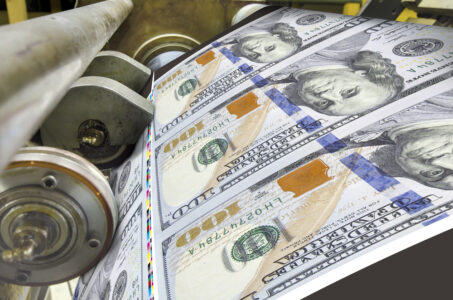Global stocks rallied at the end of the week after Beijing said it may enter trade talks with the US, a move that would represent a major thaw of the icy trade chill. The European Union (EU) wants to reduce its trade surplus with the US, but without compromising on legislation. Markets are keenly awaiting US payrolls data, which are released later on Friday, with the figures likely to be scrutinised to see any sign of a slowdown in economic activity.
This week, Donald Trump passed the 100-day milestone in his second term in office. How is he progressing with his stated policy objectives? After data showed that the US economy contracted in the first three months of 2025, what has 100 days of Trump done to the world?
On the corporate front, the third quarter earnings season continued apace. Amazon’s Cloud results disappointed and Apple said it had shifting production of most iPhones and other devices to be sold in the US away from China. Builders merchant Travis Perkins shares have continued fall after annual results showed a 99% fall in operating profit.
The FTSE 100 was up 1.6% over the week by mid-session on Friday, with the more UK-focused FTSE 250 trading up 2.7%.
Five financial planning tips for female entrepreneurs
How to become an entrepreneur and start your own business venture
Trump trade war
Brussels wants to increase purchases of US goods by €50bn to address the “problem” in the trade relationship, the European Union’s (UN’s) top negotiator has said, adding that the bloc is making “certain progress” towards striking a deal. But Maroš Šefčovič, the EU’s trade commissioner, suggested in an interview with the Financial Times that the bloc would not accept Washington keeping in place 10% tariffs on its goods as a fair resolution to trade talks. Steep tariffs are due to be imposed on the EU and multiple countries in early July, leaving the bloc racing to avoid a full-blown transatlantic trade war.
US President Donald Trump has taken action to ease the impact of new tariffs on the car making industry. The change will allow companies with US factories to reduce the amount they pay in import taxes on foreign parts, using a formula tied to how many cars they sell and the price. The provision is intended to provide relief to businesses for two years as they rework their supply chains, the White House said.
Officials also moved to shield car firms from facing mounting tariffs on the same items. They said businesses that have to pay tariffs on cars and parts would not be charged other duties the administration has imposed on steel, aluminium and goods from Canada and Mexico.
Could the UK emerge from the current trade chaos with improved deals with the European Union and the United States?
The changes came as Trump visited Michigan on Tuesday for a rally to mark his first 100 days in office. The state is home to the so-called Detroit ThrA duty-free loophole for low-value packages which has been closed by Donald Trump, pushing up prices for US customers of companies such as Shein and Temu. The Chinese online retail giants relied on the so-called "de minimis" exemption to sell and ship low-value items directly to the US without having to pay duties or import taxes.
Supporters of the loophole, which applied to parcels worth less than $800 (£600), argue it helped streamline the customs process. But both Trump and his predecessor, Joe Biden, said it damaged American businesses and was used to smuggle illegal goods, including drugs.
Could the UK emerge from the current trade chaos with improved deals with the European Union and the United States? The UK and EU start discussions on 19 May and here we look at the UK’s quest for trade deals.
Economics
The US economy contracted in the first quarter of the year, mainly due to Donald Trump’s trade policy. Details of the administration’s policy were announced after the quarter end, so the data does not represent the scale of the levies that caused so much shock in global markets, merely the anticipation. There was a more technical reason for the contraction – a surge in imports ahead of the expected introduction of tariffs. These are a subtraction when the GDP figure is being put together. It is in the upcoming quarters where we will start to see the real impact of President Trump’s policy on the economy. Nevertheless, the figures mean a “Trump recession” has just got closer to hand.
UK retail sales rose at the fastest pace for almost four years in the first few months of the year, after warmer weather helped boost sales in March. Between January and March, sales volumes were up 1.6% from the previous three months, according to the Office for National Statistics (ONS), which was the biggest quarterly rise since July 2021. March's sunny weather provided a boost for garden centres, and demand for clothing and DIY goods also improved. However, the ONS said food sales volumes fell, particularly at supermarkets.
Reform UK leader Nigel Farage on Friday claimed he now leads Britain’s main opposition to Sir Keir Starmer’s government after his party won the Runcorn & Helsby by-election, ousting Labour by just six votes. Farage’s right wing populist party was making big gains against Labour and Conservatives across England in the first big test of public opinion since last year’s general election. Results will be declared throughout Friday. Reform also seized its first mayoralty overnight, in Greater Lincolnshire, as former Tory MP Dame Andrea Jenkyns pushed her old party into a distant second place.
Geopolitics
The Trump administration will approve its first sale of military equipment to Ukraine since Donald Trump took office. This was an indication that the minerals deal signed by the two countries this week may open a path to renewed weapons shipments. The State Department certified a proposed licence to export “$50m or more” (£37.6m) of defence hardware and services to Ukraine, according to a communication sent to the US committee on foreign relations. It would mark the first permission of its kind since Trump paused all Ukraine-related military aid shortly after taking office.
Ukraine’s president, Volodymyr Zelenskyy, said on Thursday evening that the signing of the long-discussed minerals deal – on much better terms for Ukraine than had previously been expected – was a result of the meeting he held with Trump on the sidelines of the pope’s funeral on Saturday.
Israel’s air force launched airstrikes against unidentified targets near Syria’s presidential palace, in what Israeli officials said was a warning to the Syrian government after days of bloody clashes near Damascus between pro-government militia and fighters from the Druze minority sect. “This is a clear message to the Syrian regime. We will not allow the deployment of forces south of Damascus or any threat to the Druze community,” a statement released by the Israeli government said. Benjamin Netanyahu said the strikes were intended to deter Syria’s new leadership from any hostile move against the Druze.
Companies
Apple said it had been shifting production of most iPhones and other devices to be sold in the US away from China. Most of the iPhones bound for the US market in the coming months will be made in India, while Vietnam will be a major production hub for items like iPads and Apple Watches, chief executive Tim Cook said. It comes as the technology giant estimated that US import taxes could add about $900m (£677.5m) to its costs in the current quarter, despite Trump's decision to spare key electronics from the new tariffs. The Trump administration has repeatedly said it wants Apple to move production to America.
Amazon issued first-quarter results to a blockbuster week that included a short-lived standoff between the company and White House - as investors pay keen attention to how the e-commerce giant will comment on how President Trump’s tariffs will impact its business.
HSBC beat analysts' estimates in its first-quarter results, but management warned over the impact of Donald Trump’s trade policy. The bank cautioned that loan demand and credit quality could suffer from the broader fallout of the US administration’s trade war. Europe's largest bank reaffirmed targets and unveiled a fresh $3bn share buyback as it reported a fall in profits, mainly due to one-time charges related to business disposals in Canada and Argentina.
Barclays reported strong first-quarter earnings, exceeding market expectations. Profit in the period rose 19% year on year, as a jump in trading activity in the first three months of the year boosted investment banking revenue. Management reiterated its performance goals for the year and even lifted its guidance for 2025 income to “above £12.5bn” from previous guidance of “£12.2bn”, spurred by expected growth at its domestic lending division where it has been competing strongly for mortgage and consumer lending business.
Standard Chartered reported first-quarter earnings that beat expectations on the back of strong growth in its wealth management business. The bank’s reported profit before taxation for the three months ended in March was $2.103 billion, up from $1.91bn in the equivalent period from a year ago. Consensus expectations stood at $1.905bn.
First-quarter sales at pharma giant AstraZeneca were shy of market expectations. However, profit margins beat expectations and there was strong earnings growth. Sales guidance was reiterated, and currency headwinds have moderated.
GlaxoSmithKline reported a solid start to the year, with first-quarter sales and earnings beating market expectations. There are five major new FDA product approvals expected in 2025, including for Nucala (COPD), Blenrep (multiple myeloma), and depemokimab (severe asthma and nasal polyps). Regarding tariffs, the company said it was "well positioned" to respond to the “potential financial implications”. The Trump administration has launched a probe into imports of pharmaceuticals as part of an attempt to impose tariffs on national security grounds. Mitigation options and productivity initiatives have been identified in the supply chain.
Shares in Associated British Foods shares fell after it reported a mixed set of interim figures. The company’s sugar business is suffering from weak European sugar prices, and losses made by the company’s Vivergo bioethanol business. Other than sugar, CEO George Weston spoke of “a robust performance in four of our five divisions.” The board expects Primark to show “low-single-digit sales growth for the full year.”
BP’s first-quarter results were disappointing, mainly due to weakness at its upstream-gas exploration business. The oil price has also been weak on demand fears sparked by Donald Trump’s trade strategy. There has been a big change of strategy at oil major BP with its plans to turn into an environmentally friendly renewables business scrapped. The company will significantly increase its investment in hydrocarbons.
Shell reported stronger-than-expected first-quarter profit and kept the pace of its share buyback program, even as earnings fell by more than a quarter compared to the same period last year. Shell reported adjusted earnings of $5.58bn for the first three months of the year, beating analyst expectations of $5.0bn. A separate, company-provided analyst forecast had expected Shell’s first-quarter profit to come in at $4.9bn.
Full-year profits and earnings at Next came in slightly ahead of company guidance. It also appears the new year has started better than hoped, with the retailer relying less on discounting than expected. As a result, management upgraded its guidance for full-price sales in the first half to +6.5% from +3.5%, its pre-tax profit guidance was increased slightly and earnings this year are expected to rise 8.5%. The company is focusing on international expansion and development of Next brand products.
Travis Perkins shares have continued to drop after annual results showed a 99% fall in operating profit as it faced lower market volumes and underperformance in its builders merchanting segment. The construction sector supplier also said the timing of a recovery in the sector remains hard to forecast and lowered its outlook for 2025.
Lloyds of London insurer Beazley increased the value of premiums written by 2% to $1.51bn in the first three months of 2025. Management reported improved investment income of $136m in the quarter but posted a 4% decrease in premium rates on its renewal business. This compared to a 1% increase in the equivalent period of 2024.
Aberdeen Group (formerly Abrdn) reported first-quarter net outflows of £5.2bn, weighed down by weak markets and a big redemption in its investments division. The fund manager is trying to shore up its finances under a strategy revamp led by chief executive Jason Windsor after years of tough trading conditions.
Nothing on this website should be construed as personal advice based on your circumstances. No news or research item is a personal recommendation to deal.




